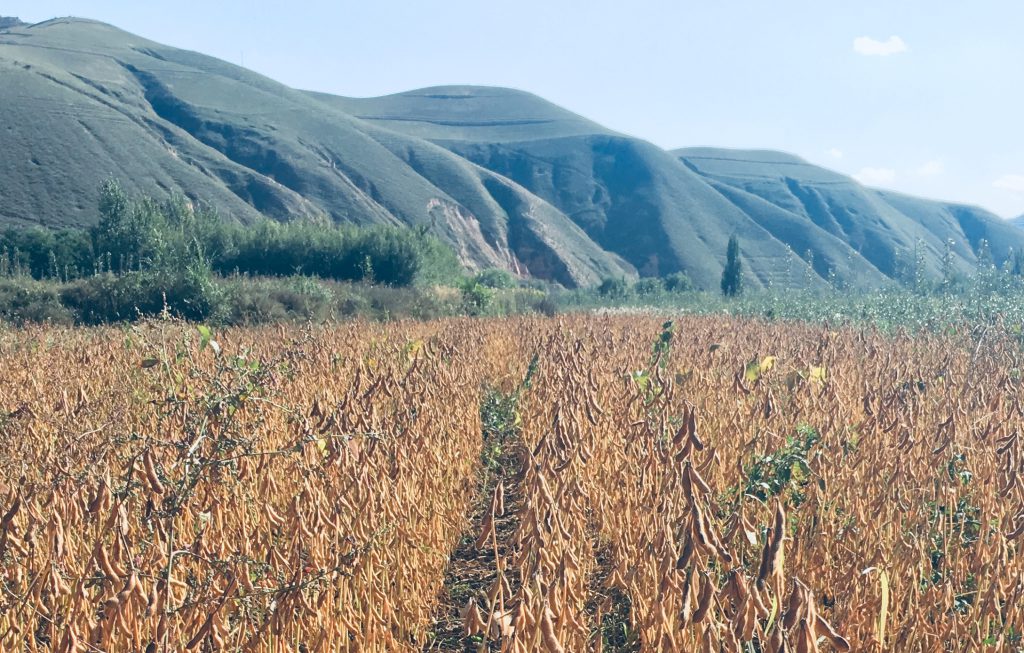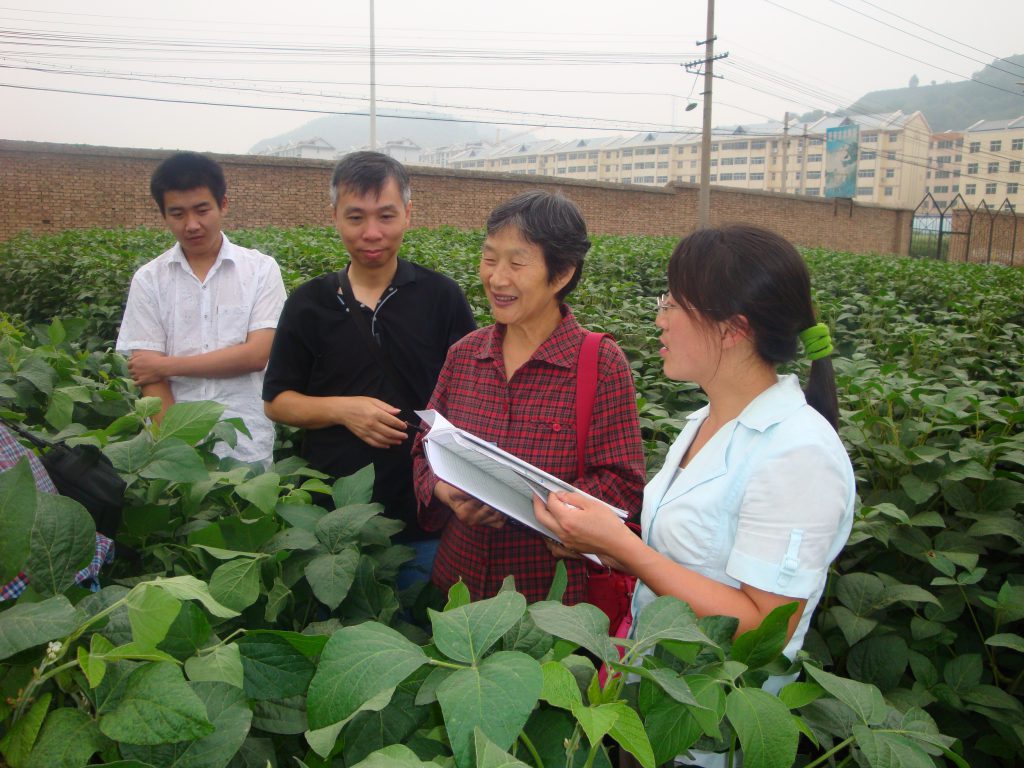Achievements
Developing stress tolerant soybeans to safeguard food security
Food insecurity is one of the most pressing problems facing humanity today: nearly a tenth of the world’s eight billion population suffer from food shortages, while more than 400 million people in Asia experience hunger. To address the global challenges of food security and environmental sustainability, Professor Lam Hon-ming has identified and cloned a novel salt tolerance gene from wild soybeans with state-of-the-art genome sequencing and molecular biology technology, and applied it to the breeding of salt-tolerant soybeans using molecular markers. He successfully developed novel non-transgenic soybean cultivars that can be grown on salinised, semi-arid land. The field application of stress-tolerant soybean cultivars enhanced the productivity of smallholder farms while facilitating reclamation of arid and semi-arid soils, and contributing to sustainable development goals.

Professor Lam’s research team collaborated with Professor Zhang Guohong from the Gansu Academy of Agricultural Sciences to develop three new salt- and drought-tolerant soybean varieties, Longhuang 1, 2 and 3. They had been applied on more than 40,700 hectares of land as of 2021.
The homecoming of soybean
The soybean is an ancient crop: accounts of its cultivation date right back to the Book of Songs, a 3,000-year-old collection of Chinese poems. Today, soybeans are grown all over the world and are an integral component of human diets. However, after thousands of years of domestication, biodiversity among soybeans has been lost and some stress tolerance traits of wild soybeans no longer exist in some cultivated soybeans, leading to poor harvests in adverse environments and under extreme climate challenges. In mainland China, soybean production has been negatively affected by the shortage of arable lands, water scarcity, soil salination and other unfavourable factors, leading the country to rely primarily on imports from overseas, including the U.S. and Latin America, to meet its demand.
“China has a lot of saline-alkaline soils in its northeast and semi-arid and arid lands in its northwestern regions,” said Professor Lam. “Soybean is a nitrogen-fixing crop that can convert atmospheric nitrogen to nitrogenous compounds readily available for plants’ growth. That makes it an environmentally friendly crop that can restore fertility to agricultural lands, reduce the use of fertilisers and improve air quality; therefore, it is worth studying.”

Professor Lam and Professor Shao Guihua (second from right) visit a soybean farm in mainland China.
In 1997, Professor Lam returned to CUHK after receiving his postdoctoral training on nitrogen metabolism in plants in the U.S., and by happenstance met Professor Shao Guihua, a researcher at the Chinese Academy of Agricultural Sciences. Inspired by her, Professor Lam has devoted himself to research on the salt tolerance genes of soybeans. In subsequent years, Professor Lam reached a number of milestones; for example, he decoded the genomes of 17 wild varieties and 14 cultivated varieties of soybean with whole genome sequencing technology, which also proved the biodiversity of wild soybeans. A few years later, he identified a major salt tolerance gene from domesticated soybeans’ wild relatives.
However, findings in the laboratory or research papers cannot benefit society unless they are applied to the field. “At present, soybeans produced in China only meet about 20% of domestic consumption, and the country relies on imports for the rest, which account for about 60% of the world’s soybean imports. I really hope the technology we have developed can serve the country fruitfully,” said Professor Lam.
His project to bring soybeans back to China, which he calls “Soybean Homecoming”, has led him to collaborate with Professor Zhang Guohong from the Gansu Academy of Agricultural Sciences, combining cutting edge genomics technology with traditional agricultural knowledge. They sped up the screening of soybean seeds in Northwest China by integrating molecular markers and traditional breeding, and successfully developed three new cultivars of stress-tolerant soybean. The new cultivars are tolerant to salt and drought, and contribute to the development of sustainable agriculture in the region. Professor Lam has also been endeavoring to develop new soybean cultivars for forage use.

Professor Lam’s research team is among the pioneers globally in the field of soybean genomics.
Going global with international crop genomics research platform
These research findings come from a laboratory located at CUHK Science Centre – the RGC-AoE Center for Genomic Studies on Plant-Environment Interaction for Sustainable Agriculture and Food Security. Not only does the centre serve as a research base for 13 professors in Hong Kong, but it has also created an academic exchange hub to nurture collaboration with international experts from China, the U.S., the U.K. and Argentina. The centre is committed to investigating the underlying mechanisms of plant-environment interactions in order to promote sustainable agricultural development, research and collaboration on crop genomics. Professor Lam is also the Director of the State Key Laboratory of Agrobiotechnology (CUHK). Through collaborations with top scientists from mainland China, the laboratory envisions to improve the yield, quality and stress-tolerance of crops by developing applications of molecular and agricultural biotechnology.
Apart from collaborating with mainland China, Professor Lam’s research team has also collaborated with peers in South Africa. They jointly initiated a soybean cultivation programme with a 20-hectare trial farm in South Africa to help farmers there to improve their harvest yields. From China to South Africa, Professor Lam’s research has resulted in tangible outcomes that benefit both people and the environment.
“Professor Lam’s objective is to establish an international soybean research centre in Hong Kong, bringing together the best soybean varieties and experts in the field to make a contribution to the benefit of mankind.”
Professor Lam Hon-Ming
Choh-Ming Li Professor of Life Sciences and Director, State Key Laboratory of Agrobiotechnology (CUHK)
Research areas: Soybean genomics studies and their agricultural applications
Major achievements:
- The announcement of world’s first reference-grade wild soybean genome (2019)
- Second-class Award in Natural Sciences, Ministry of Education Higher Education Outstanding Scientific Research Output Awards (2016)
- The first to discover and clone the novel salt-tolerant gene from wild soybean (2014)
- Decoded and published the genomes of 31 wild and cultivated soybeans as a cover story in the prestigious journal Nature Genetics (2010)
- Developed Longhuang 1, 2 and 3, three salt- and drought-tolerant soybean varieties, with field application across the 2,000 km of arid lands in the Loess Plateau
- CUHK Vice-Chancellor’s Exemplary Teaching Award (1999, 2006)


